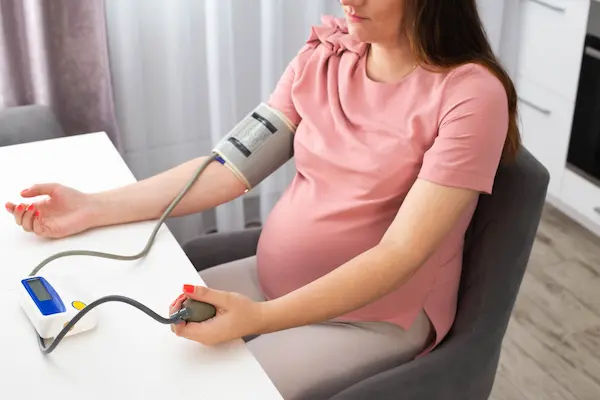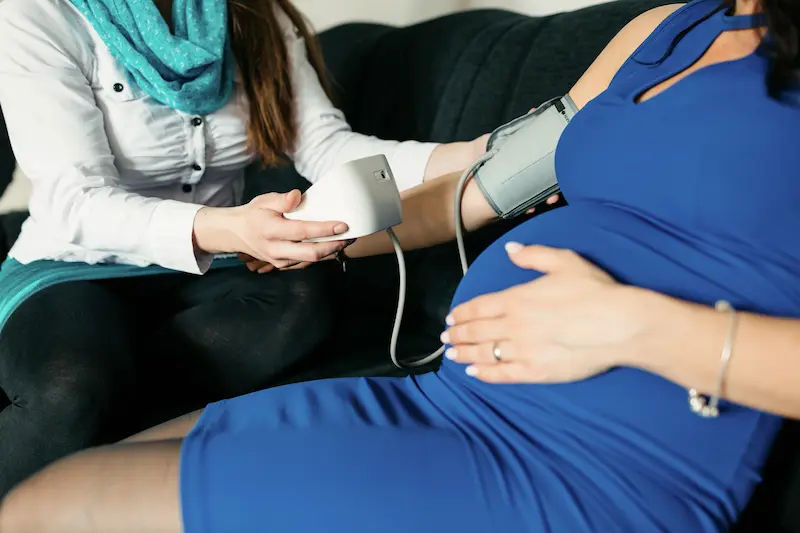Natural Treatments For Low Bp During Pregnancy
Manage low blood pressure naturally and safely during pregnancy. Discover effective home remedies, diet tips, and hydration strategies to keep you and your baby healthy.

Written by Dr. Md Yusuf Shareef
Reviewed by Dr. Dhankecha Mayank Dineshbhai MBBS
Last updated on 13th Jan, 2026

Introduction
Feeling lightheaded, tired, or faint during pregnancy? You’re not alone. Many women experience low blood pressure (also called hypotension) at some point in pregnancy—especially in the first and second trimesters—as the body adapts to support a growing baby. While a modest drop in blood pressure can be normal, frequent dizziness or near-fainting can be unsettling and impact your day. The good news: simple, natural strategies can make a big difference, and knowing when to seek medical care keeps you and your baby safe.
In this comprehensive guide, we’ll explain why low blood pressure happens in pregnancy, common symptoms, and science-backed, natural treatments you can start today. You’ll learn practical tips for hydration, nutrition, posture, sleep, exercise, and managing dizziness episodes, plus red flags that warrant prompt medical attention. We’ll also cover special situations like anemia and thyroid issues, and provide a quick routine you can follow daily. Throughout, we’ll reference trusted medical sources and share unique, real-life solutions that aren’t in every article. If your symptoms persist or worsen, consider consulting a doctor online with Apollo24|7 for further evaluation and tailored advice. Let’s help you feel steadier, safer, and more in control.
What does “low BP” mean in pregnancy?
A moderate drop in blood pressure is common in pregnancy, especially through mid-pregnancy, due to hormonal changes that relax blood vessel walls and increase the circulatory capacity. Many women feel this as occasional lightheadedness or fatigue. Clinically, low blood pressure (hypotension) is often defined as a reading below 90/60 mmHg, but what matters most in pregnancy is how you feel, the trend over time, and whether there are warning signs. For example, someone whose usual pressure is 120/80 may feel unwell at 95/60, while another person may be fine at that level.
Normal trimester changes:
First trimester: Progesterone rises, causing vasodilation; BP often begins to dip.
Second trimester: BP typically reaches its lowest point around weeks 16–24, often 5–10 mmHg lower than pre-pregnancy, then gradually rises again.
Third trimester: BP trends toward pre-pregnancy baseline; sudden changes, especially upward spikes, warrant medical evaluation.
Understanding your numbers:
• Systolic (top number) reflects heart's contraction pressure.
• Diastolic (bottom number) reflects pressure between beats.
• Patterns matter: Orthostatic drops—when BP falls within 1–3 minutes of standing—can cause dizziness (orthostatic hypotension).
Home monitoring can help if you’re symptomatic. Measure at the same time daily, seated and calm, and after standing. Track symptoms alongside the readings (e.g., headaches, nausea, vision changes). If readings are persistently very low (e.g., below 90/60) or symptoms interfere with daily life, discuss with your doctor. If symptoms persist beyond two weeks or are accompanied by red flags (below), consult a doctor online with Apollo24|7 for further evaluation.
Consult a Top General Physician
Why blood pressure drops?: causes and risk factors
Physiologic causes:
• Hormonal vasodilation: Progesterone relaxes vessel walls, lowering vascular resistance; the circulatory system expands to support the placenta and baby. This normal adaptation lowers BP, most noticeably in the second trimester.
• Venous pooling: The growing uterus and relaxed veins can pool blood in the legs, especially when standing, reducing return to the heart and causing dizziness on position changes.
Common contributors you can address:
• Dehydration: Morning sickness, hot weather, or inadequate intake reduces blood volume and pressure.
• Skipped meals or prolonged gaps: Low blood sugar can worsen symptoms of low BP, even if BP numbers aren’t dramatically low.
• Anemia: Low iron or B12 can reduce oxygen delivery and aggravate fatigue and dizziness.
• Infection or fever: Can cause dehydration and vasodilation.
• Medications: Antihypertensives, certain antidepressants, or high-dose magnesium can lower BP. Always review all prescriptions and supplements with your obstetrician.
Higher risk scenarios:
• Hyperemesis gravidarum: Severe vomiting leads to dehydration and electrolyte imbalance.
• Multiple gestation (twins): Increased circulatory demands.
• Small body size or low baseline BP.
• Prolonged bed rest or very sedentary routines blunt the calf muscle pump that helps return blood to the heart.
Symptoms to watch and when to seek medical care?
Common symptoms of hypotension in pregnancy include:
• Dizziness or lightheadedness, especially on standing
• Fainting (syncope) or near-fainting
• Fatigue and brain fog
• Nausea or cold, clammy skin
• Blurred vision or “graying out”
• Palpitations (may reflect normal circulatory changes but require evaluation if persistent)
Red flags that require urgent evaluation:
• Chest pain, shortness of breath, or a racing heartbeat that does not settle
• Severe, persistent headache; new visual changes (flashes, blind spots)
• Fainting with injury, falling down stairs, or hitting your abdomen
• Vaginal bleeding, severe abdominal pain, or decreased fetal movement
• Signs of severe dehydration (very dark urine, minimal urination, inability to keep fluids down)
If you experience any of the above, seek emergency care or contact your obstetric provider immediately.
Home monitoring:
• Check BP seated and after standing for 1–3 minutes if dizziness occurs on standing (orthostatic check).
• Keep a simple symptom diary: time of day, triggers (heat, standing, long gaps between meals), and interventions tried.
When to consult a clinician:
• Persistent daily symptoms beyond two weeks
• Systolic BP consistently below 90 mmHg with symptoms, or frequent fainting
• Concern for anemia, thyroid issues, or medication side effects
If your condition does not improve after trying these methods, book a physical visit to a doctor with Apollo24|7. They can review your history, medications, and order targeted tests.
Natural treatments that work day-to-day
Hydration and electrolytes:
• Aim for steady intake across the day (roughly 2–2.5 liters unless otherwise directed), more in heat or with vomiting. Include electrolytes to help fluid “stick” in your bloodstream. Options: pregnancy-safe oral rehydration solutions, coconut water in moderation, or DIY mix (approx. 1 liter water + a small pinch of salt + splash of citrus + a teaspoon of honey). Avoid high-sugar sports drinks.
Smart salt use and small, frequent meals:
• If you don’t have high BP or swelling disorders, modestly increasing dietary sodium can help maintain blood volume. Try salted nuts, whole-grain crackers with cheese, or broth-based soups. Pair complex carbs with protein and healthy fat to avoid sugar dips. Discuss salt changes with your obstetrician if you have any cardiovascular or kidney concerns.
Compression stockings, posture, and position changes:
• Graduated compression stockings (knee-high, 15–20 mmHg) can reduce venous pooling and orthostatic dizziness. Put them on before getting out of bed. Rise slowly: sit → dangle legs → stand. In queues or while cooking, practice calf raises or shift weight to encourage blood return.
Gentle movement and breathing:
• Short, frequent walks and simple prenatal exercises activate the “calf pump,” assisting circulation. Try 10-minute bouts, 2–3 times daily. Incorporate diaphragmatic breathing to enhance venous return and relaxation.
Sleep and rest:
• Prefer left-side sleeping to optimize blood flow to the uterus and kidneys. Use pillows behind the back and between knees. Avoid lying flat on your back after mid-pregnancy to prevent vena cava compression.
Unique insight: “Hydration timing” matters as much as total volume. Try a 300–400 ml fluid “pre-load” 20–30 minutes before showering, commuting, or standing tasks; add a salty snack if episodes cluster in the morning. Many find this prevents daily dips better than chasing symptoms after they start.
Nutrition strategies to stabilize BP
Balanced meals and timing:
Build each meal with complex carbohydrates (oats, brown rice, whole-grain bread), lean proteins (eggs, legumes, yogurt), and healthy fats (avocado, nuts). This slows glucose swings that can mimic or worsen low-BP symptoms. Eat every 3–4 hours; include a mid-morning and mid-afternoon snack.
Micronutrients that matter:
• Iron: Low iron (with or without anemia) can exacerbate fatigue and dizziness. Include iron-rich foods (lean red meat, beans, lentils, spinach) with vitamin C sources to boost absorption. If indicated, your doctor may prescribe a prenatal iron supplement. B12 and folate: Essential for red blood cell production; vegetarians or those with limited intake may need tailored supplements.
• Electrolytes: Potassium and magnesium from whole foods (bananas, leafy greens, beans) support fluid balance and nerve conduction.
Testing and tailoring:
If you have fatigue, pallor, or shortness of breath, ask about blood tests for hemoglobin, ferritin (iron stores), B12, and folate. Apollo24|7 offers convenient home collection for tests like CBC and ferritin, which can guide more precise nutrition.
Caffeine and herbal products:
• Moderate caffeine (up to 200 mg/day from all sources) is generally considered safe in pregnancy; it may provide a mild boost in alertness but can also transiently raise heart rate. Avoid using caffeine as a primary “treatment” for low BP.
• Herbal cautions: Avoid licorice root (glycyrrhizin) due to links with adverse pregnancy outcomes and blood pressure effects. Be cautious with herbal “circulation” blends and always review ingredients with your clinician.
Handling dizziness episodes: a step-by-step plan
When dizziness hits:
1) Safety first. Sit or lie down immediately to prevent falls. If possible, lie on your left side. Elevate your legs on a pillow or against a wall to promote venous return.
2) Breathe and cool. Practice slow, diaphragmatic breaths (4 seconds in, 6 out) for 1–2 minutes. Fan your face or cool the back of your neck; heat worsens vasodilation.
3) Fluids + salt. Sip 200–300 ml of water or an electrolyte drink; add a small salty snack (e.g., salted crackers with peanut butter) if you’ve gone more than 3 hours since eating.
4) Micro-movements. If you must remain upright (e.g., in a public place), do subtle calf raises, buttock squeezes, or cross your legs and tense your thighs for 30 seconds to help raise BP via the “skeletal muscle pump.”
5) Reassess. If symptoms pass within 10–15 minutes, resume activities gradually. If they persist or worsen, contact your clinician.
A “flare day” plan:
• Pre-hydrate on waking with 300–400 ml fluids and a protein-carb snack in bed (e.g., yogurt + granola).
• Wear compression stockings and choose supportive footwear.
• Break standing tasks into 10–15 minute chunks with sit breaks.
• Keep cool: use a fan, avoid long hot showers, and dress in layers.
• Pack a “steady kit”: water bottle, electrolyte sachet, salty nuts, compression socks, and a small folding fan.
Special situations and when natural care isn’t enough
Low BP plus anemia:
• Symptoms overlap (fatigue, dizziness), but anemia adds shortness of breath, pallor, and exercise intolerance. Treatment is different: an iron-rich diet and iron supplementation if prescribed. Rechecking levels ensures improvement.
Thyroid or adrenal concerns:
• Hypothyroidism can contribute to fatigue and low heart rate; adrenal issues are rare but can cause low BP. If you have weight changes, cold intolerance, or unusual salt cravings, discuss testing with your clinician.
Medication review:
• Some drugs and supplements can lower BP. Share a full list—including over-the-counter meds, herbal teas, and magnesium—with your obstetrician. Never start new supplements marketed for “circulation” without medical advice.
Testing your clinician may order:
• CBC and ferritin (iron), B12/folate if indicated
• Thyroid panel (TSH ± free T4) if symptoms suggest
• Urinalysis if dehydration or infection is suspected
• Orthostatic vitals (lying, sitting, standing)
• ECG if palpitations, chest pain, or concerning heart symptoms
When to escalate care:
• Frequent fainting, injuries from falls, persistent symptoms despite optimized hydration, nutrition, and compression
• Any red flag symptoms (see above)
• If symptoms persist beyond two weeks, consult a doctor online with Apollo24|7 for further evaluation. If your condition does not improve after trying these methods, book a physical visit to a doctor with Apollo24|7 for an in-person assessment.
Safe exercise and yoga modifications
What to try:
• Short, frequent movement is better than a single long session—think 10–20 minutes of walking, prenatal yoga, or stationary cycling, 4–6 days per week.
• Circulation-boosters: ankle pumps, heel-toe rocks, calf raises, and wall push-ups encourage venous return without stressing joints.
• Prenatal yoga: seated forward folds with wide legs, side-lying poses, cat-cow, and supported bridge (with a wedge, not flat on the back in later pregnancy).
What to skip or modify:
• Hot yoga or high-heat environments (increase vasodilation and dehydration risk).
• Long periods lying flat on your back after mid-pregnancy (vena cava compression).
• Rapid position changes from floor to standing; add transitions and props.
• High-intensity intervals that leave you dizzy or breathless.
Hydration, temperature, recovery:
• Drink 200–300 ml before exercise and sip during. Use a fan or cool room and wear breathable layers.
• Cool down with gentle stretches and diaphragmatic breathing.
• If you feel lightheaded, pause, lie left side, elevate your legs, and hydrate.
Travel, hot weather, and daily living tips
Commuting and travel:
• Pre-hydrate and snack before leaving. Wear compression socks on long rides. On trains/buses, stand near a seat and sit if dizzy. On flights, walk the aisle hourly and avoid crossing legs for long periods.
Heat management:
• Choose cool showers over hot; limit sauna/steam room exposure. Carry a handheld fan and mist bottle. Favor breathable fabrics and shade.
• Standing in queues:
• Rock from heel to toe, do calf raises, or perform subtle thigh squeezes. Shift weight often. If a long queue is unavoidable, pre-hydrate and have a salty snack handy.
Workday strategies:
• Use a footrest to elevate legs when seated. Schedule short walk breaks every hour. Avoid skipping lunch; keep snacks at your desk. Keep an extra pair of compression socks in your bag.
Home setup:
• Non-slip mats in the bathroom; a shower stool can prevent faint-related slips. Keep water within arm’s reach throughout the home. Consider a bedside snack and water for early mornings.
Unique insight: “Cool cook” strategy. If evening kitchen heat triggers dizziness, prep ingredients early when the house is cooler, use smaller pans (less steam), and position a fan toward your torso—not the stove—to prevent overheating and vasodilation during meal prep.
Partner and caregiver guide
How to help during a dizzy spell:
• Guide the pregnant person to sit or lie left side; elevate legs if possible.
• Offer cool air or a cold pack to the back of the neck, and a small glass of water.
• Stay nearby for 10–15 minutes, watching for recovery or red flags (confusion, chest pain, severe headache).
Fall prevention:
• Add non-slip mats, clear clutter, secure loose rugs, and ensure good lighting. Place commonly used items at waist height to reduce bending or reaching.
Daily support:
• Share standing tasks (cooking, dishes) during symptomatic periods.
• Pack a “steady kit” before outings: water, an electrolyte sachet, a salty snack, and a fan.
• Encourage consistent meal/snack timing and hydration reminders (set shared phone alerts).
Myths vs. facts about low BP in pregnancy
• Myth: “Low BP is always dangerous in pregnancy.” Fact: A mild drop is normal and often harmless; your symptoms and context matter most.
• Myth: “More salt fixes low BP.” Fact: Modest increases can help, but excess salt isn’t universally safe. Personalize with your clinician, especially if you have swelling or other conditions.
• Myth: “Coffee is a cure.” Fact: Caffeine may mask fatigue briefly, but doesn’t address volume depletion and may increase palpitations. Focus on fluids, electrolytes, and balanced meals.
• Myth: “If fainting happens once, it will always happen.” Fact: Identifying triggers (heat, standing, dehydration) and using compression, hydration timing, and movement strategies often reduces episodes.
• Myth: “Herbal teas are safer than medicine.” Fact: Some herbs (e.g., licorice root) can be harmful in pregnancy. Always discuss herbal products with your obstetrician.
Prevention checklist you can save
• Start the day with 300–400 ml of fluids and a protein-carb snack.
• Wear knee-high compression stockings before getting out of bed.
• Eat small, frequent meals; pair carbs with protein/fat.
• Carry water, electrolytes, and a salty snack.
• Use micro-movements when standing; rise slowly from sitting.
• Sleep on your left side with supportive pillows.
• Keep showers warm—not hot—and limit heat exposure.
• Schedule brief walks or “circulation snacks” hourly.
• Track symptoms, triggers, and BP; share patterns with your clinician.
Consult a Top General Physician
Conclusion
Low blood pressure in pregnancy is common, especially in the second trimester, and for many people, it’s more of a comfort issue than a crisis. Still, dizziness or fainting can disrupt daily life and raise safety concerns. The most reliable natural treatments focus on the basics: steady hydration with electrolytes, small and frequent balanced meals, modest salt intake when appropriate, compression stockings, gentle movement, left-side rest, and avoiding heat. Layered together, these strategies stabilize circulation and reduce episodes of dizziness and near-fainting.
If symptoms persist beyond two weeks or interfere with your daily life, consult a doctor online with Apollo24|7 to personalize your plan. If your condition does not improve after trying these methods, book a physical visit to a doctor with Apollo24|7. With the right approach, most pregnant people find they can minimize dizziness, feel steadier, and move through pregnancy more comfortably.
Consult a Top General Physician

Dr. Srujana Mulakalapalli
General Physician/ Internal Medicine Specialist
5 Years • MBBS, MD (GENERAL MEDICINE)
Bengaluru
Apollo Medical Center, Marathahalli, Bengaluru
(25+ Patients)

Dr. Vivek D
General Physician
4 Years • MBBS
Bengaluru
PRESTIGE SHANTHINIKETAN - SOCIETY CLINIC, Bengaluru

Dr. Anand Ravi
General Physician
2 Years • MBBS
Bengaluru
PRESTIGE SHANTHINIKETAN - SOCIETY CLINIC, Bengaluru

Dr Syed Mateen Pasha
General Physician
2 Years • MBBS
Bengaluru
PRESTIGE SHANTHINIKETAN - SOCIETY CLINIC, Bengaluru

Dr. M L Ezhilarasan
General Practitioner
6 Years • MBBS
Visakhapatnam
Apollo 24|7 Clinic - Andhra Pradesh, Visakhapatnam
Consult a Top General Physician

Dr. Srujana Mulakalapalli
General Physician/ Internal Medicine Specialist
5 Years • MBBS, MD (GENERAL MEDICINE)
Bengaluru
Apollo Medical Center, Marathahalli, Bengaluru
(25+ Patients)

Dr. Vivek D
General Physician
4 Years • MBBS
Bengaluru
PRESTIGE SHANTHINIKETAN - SOCIETY CLINIC, Bengaluru

Dr. Anand Ravi
General Physician
2 Years • MBBS
Bengaluru
PRESTIGE SHANTHINIKETAN - SOCIETY CLINIC, Bengaluru

Dr Syed Mateen Pasha
General Physician
2 Years • MBBS
Bengaluru
PRESTIGE SHANTHINIKETAN - SOCIETY CLINIC, Bengaluru

Dr. M L Ezhilarasan
General Practitioner
6 Years • MBBS
Visakhapatnam
Apollo 24|7 Clinic - Andhra Pradesh, Visakhapatnam
Consult a Top General Physician

Dr. Srujana Mulakalapalli
General Physician/ Internal Medicine Specialist
5 Years • MBBS, MD (GENERAL MEDICINE)
Bengaluru
Apollo Medical Center, Marathahalli, Bengaluru
(25+ Patients)

Dr. Vivek D
General Physician
4 Years • MBBS
Bengaluru
PRESTIGE SHANTHINIKETAN - SOCIETY CLINIC, Bengaluru

Dr. Anand Ravi
General Physician
2 Years • MBBS
Bengaluru
PRESTIGE SHANTHINIKETAN - SOCIETY CLINIC, Bengaluru

Dr Syed Mateen Pasha
General Physician
2 Years • MBBS
Bengaluru
PRESTIGE SHANTHINIKETAN - SOCIETY CLINIC, Bengaluru

Dr. M L Ezhilarasan
General Practitioner
6 Years • MBBS
Visakhapatnam
Apollo 24|7 Clinic - Andhra Pradesh, Visakhapatnam
More articles from pregnancy
Frequently Asked Questions
1) Is low blood pressure in the second trimester normal?
Yes. A dip in blood pressure around weeks 16–24 is common due to hormonal vasodilation and circulatory changes in pregnancy. Monitor symptoms and trends, and seek care if red flags occur or symptoms persist.
2) What are the best home remedies for low BP in pregnancy?
Hydration with electrolytes, small salty snacks (if safe for you), compression stockings, slow position changes, and left-side rest are the core natural remedies for low blood pressure.
3) Can anemia cause or worsen low BP symptoms?
Anemia doesn’t usually lower BP directly but can worsen dizziness and fatigue. Iron-rich foods and supplements (if prescribed) help; consider labs like hemoglobin and ferritin. Apollo24|7 offers home collection for these tests.
4) Are electrolyte drinks safe during pregnancy?
Many are safe in moderation. Choose low-sugar options, or make a simple home mix (water + a small pinch of salt + citrus). Avoid high-caffeine or herbal stimulant drinks; review labels with your clinician.
5) When should I see a doctor about low BP?
If you have frequent fainting, chest pain, shortness of breath, severe headache, vision changes, injuries from falls, or symptoms that persist beyond two weeks despite self-care, seek medical evaluation. Consider an online consult with Apollo24|7.




